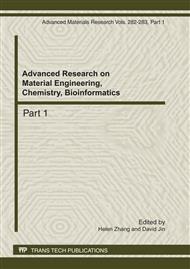p.3
p.7
p.13
p.17
p.21
p.26
p.32
p.38
Correlation between Clinicopathology and Immunolocalization of Heat Shock Protein 72 and Glycoprotein 96 in Human Hepatocellular Carcinomas
Abstract:
Heat shock protein 72 (HSP72) and glycoprotein 96 (gp96) are highly expressed in cancer tissues. Recent studies indicate the possible roles of HSP72 and gp96 in the development and progression of gastrointestinal carcinomas but detailed information is still ambiguous. The aim of the study is to investigate the correlation between clinicopathology and immunolocalization of HSP72 and gp96 in human hepatocellular carcinoma. Immunohistochemistry demonstrated that HSP72 and gp96 expression in hepatocellular carcinomas with metastasis was significantly higher than those with non-metastasis. HSP72 and gp96 expression were significantly associated with the presence of tumor infiltration, lymph node and remote metastasis.
Info:
Periodical:
Pages:
3-6
DOI:
Citation:
Online since:
July 2011
Authors:
Price:
Сopyright:
© 2011 Trans Tech Publications Ltd. All Rights Reserved
Share:
Citation:


